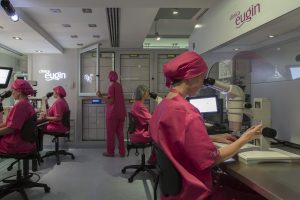Patients who turn to assisted reproduction request more research into the side effects of pharmacological treatments, psychological aspects and impact of diet when tackling an infertility problem. As evidenced in the Eugin Group pioneer study of international scope, carried out via a questionnaire which 945 patients (men and women) from their 12 centres in Spain, Italy, Denmark, Colombia and Brazil, took part in.
The purpose of the study signed by 25 experts and carried out in: Catalan, Danish, English, French, Portuguese and Spanish, was to identify topics related to infertility and assisted reproduction requiring urgent research according to patients’ concerns. Studies of this nature have been done before in other medical fields regarding chronic or life-threatening diseases such as cancer; however, this is the first time in the field of infertility and assisted reproduction.
Researchers divided the questionnaire into 3 large blocks (causes and prevention of infertility, treatments and assisted reproduction techniques, and psychological aspects), and requested the participants to ask questions of their interest in each of these blocks. The answers were analysed to establish a ranking of 30 topics from which the ‘top ten’ of the patients’ research priorities were extracted.
The topic most demanded by patients for research was that of the side effects (short and long-term) of the pharmacological treatments (hormonal treatments for ovarian stimulation), with a frequency of 51.6% in the questionnaires. This was followed by the demand for research into the psychological aspects affecting infertility (risk of depression, anxiety about not having children, likewise family and social impact, among others), with a frequency of 35.7%; and the impact of diet on fertility with a frequency of 25.9%.
The list of priority research topics is completed with: success in assisted reproduction (24.8%), health habits (20%), risks associated with assisted reproduction (18.5%), alternative therapies (18.5%), impact of physical exercise (15.4%), oocyte quality and ovarian reserve (9.5%); and genetic and hereditary causes of infertility (9.5%).
Differences in priorities
“We had expected the side effects of pharmacological treatments to top the list of priorities; however, we were surprised by patients’ priority for research into food related topics. Perhaps, it’s because this is something relatively easy for patients to modify”, according to Dr Desirée García, main author of the study. “For example, we were asked to research as to whether there were any vitamin complements or foods which might prevent infertility”, she explained.
Dr García also highlighted how the study had brought to light the importance of psychological aspects affecting people who undergo assisted reproduction treatments, and which doctors do not always give sufficient importance to.
Holistic approach to infertility
According to the scientific director of Eugin Group, Dr Rita Vassena, the most valuable conclusion of this study is: “the importance given by patients to the holistic approach to infertility.”, and confirmed this something they would be including in future research leadered by her team. “We need to treat people not diseases, and study the best way to do it. In our case, Eugin Group commitment to research must go hand-in-hand with our patients’ needs, which is why we’ve decided to intensify our research lines in those areas they’ve clearly indicated to us.”
“I should also like to encourage scientific communities and research financing bodies to take note of patients’ opinions, which were so clearly expressed in this study, when defining their priorities.”, concluded Dr Vassena.
About Eugin
As a result of their 20 year history, Eugin has a group of assisted reproduction centres of Spanish and international reference with clinics in: Spain, Italy, Denmark, Colombia, Brazil, Sweden and Latvia.
Since its inauguration in Barcelona in 1999, the group has treated thousands of patients worldwide every year. In 2017, Eugin reached 24,000 treatments, situating them as a European leader within the sector. Today, the Eugin team comprises over 650 specialists, whose training is constantly updated to provide quality friendly attention. In 2015, the assisted reproduction group was acquired by NMC Health.
